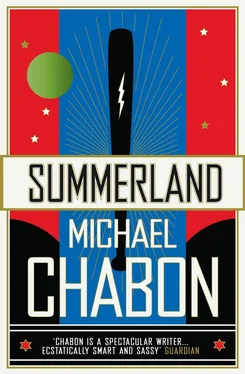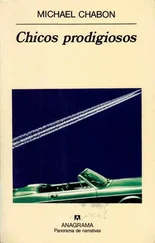Michael Chabon - Summerland
Здесь есть возможность читать онлайн «Michael Chabon - Summerland» — ознакомительный отрывок электронной книги совершенно бесплатно, а после прочтения отрывка купить полную версию. В некоторых случаях можно слушать аудио, скачать через торрент в формате fb2 и присутствует краткое содержание. Жанр: unrecognised, на русском языке. Описание произведения, (предисловие) а так же отзывы посетителей доступны на портале библиотеки ЛибКат.
- Название:Summerland
- Автор:
- Жанр:
- Год:неизвестен
- ISBN:нет данных
- Рейтинг книги:3 / 5. Голосов: 1
-
Избранное:Добавить в избранное
- Отзывы:
-
Ваша оценка:
- 60
- 1
- 2
- 3
- 4
- 5
Summerland: краткое содержание, описание и аннотация
Предлагаем к чтению аннотацию, описание, краткое содержание или предисловие (зависит от того, что написал сам автор книги «Summerland»). Если вы не нашли необходимую информацию о книге — напишите в комментариях, мы постараемся отыскать её.
Summerland — читать онлайн ознакомительный отрывок
Ниже представлен текст книги, разбитый по страницам. Система сохранения места последней прочитанной страницы, позволяет с удобством читать онлайн бесплатно книгу «Summerland», без необходимости каждый раз заново искать на чём Вы остановились. Поставьте закладку, и сможете в любой момент перейти на страницу, на которой закончили чтение.
Интервал:
Закладка:
Mr. Feld didn’t need to honk; Jennifer T. was waiting for them on the sagging porch. She picked up her huge equipment bag and came down the porch steps, taking them two at a time. She could never seem to get away fast enough from her house. There had been times in Ethan’s life – when his mother was dying inside it, for example – when Ethan had felt the same way about his own house.
As usual, Jennifer T.’s uniform was spotless. Her knit trousers, her jersey, her sanitary socks, were always somehow whiter than anybody else’s. (Jennifer T., as Mr. Feld never tired of reminding Ethan, did all of her own washing.) She had tied her long blue-black hair in a ponytail that was pulled through the gap at the back of her ball cap, where you snapped the plastic strap.
She threw her bag onto the backseat and then climbed in beside it. She carried into the car the lingering stink of her grandmother’s cigarettes and a strong odour of bubble gum – she chewed the shredded kind that pretended to be chewing tobacco in a pouch.
“Hey.”
“Hey.”
“Hello, Jennifer T.,” Mr. Feld said. “Buckle up and let me tell you what my son has been attempting to convince me to let him do.”
This was the moment that Ethan had been dreading.
“I saw a bushbaby,” he said quickly. “An African bushbaby, at first I thought it was a fox, but it walked like a monkey, and I—”
“Ethan says he wants to quit the team,” said Mr. Feld.
Jennifer T. snapped her gum a few times. She unzipped the ragged old equipment bag, patched with duct tape and stained by decades of grass and Gatorade. She took out her first-baseman’s mitt, which she kept carefully oiled with a mysterious substance called neet’s foot oil and wrapped in an Ace bandage, with a tennis ball tucked in the pocket to maintain its shape. The glove was much older than she was and had been printed with the signature of someone named Keith Hernandez. Jennifer T. unwound the bandage tenderly, filling the car with a pungent, farmyard kind of smell.
“I don’t think so, Feld,” she said. She gave her gum another loud snap. “Not going to happen.”
And that was the end of the discussion.
CLAM ISLAND WAS a small, green, damp corner of the world. It was known, if at all, mostly for three things. First was its clams. Second was the collapse, in 1943, of the giant Clam Narrows Bridge. You might have seen an old film of that spectacular disaster, on TV: the long steel bridge-deck flapping and whipping around like a gigantic loose shoelace just before it falls to pieces and splashes into the chilly waters of Puget Sound. The Clam Islanders had never really taken to the bridge that connected them to the mainland, and they were not sorry to see it go. They went back to riding the Clam Island Ferry, which they greatly preferred. You could not get a cup of coffee or clam chowder, or hear all about your neighbour’s sick cousin or chicken, on the Clam Narrows Bridge. From time to time, there would be talk of rebuilding the span, but a lot of people seemed to feel that maybe there just ought not to be a bridge connecting Clam Island to the mainland. Islands have always been strange and magical places; crossing the water to reach them ought to be, even in a small way, an adventure.
The last thing that Clam Island was known for, along with its excellent clams (if you liked clams) and its falling-down bridge, was its rain. Even in a part of the world where the people were accustomed to drizzles and downpours, Clam Island was considered uncommonly damp. It was said that at least once a day, on Clam Island, in winter or summer, it rained for at least twenty minutes. People said this about Clam Island on Orcas Island, and on San Juan Island, and down in Tacoma and Seattle. But the people of Clam Island knew that this saying was not entirely true. They knew – it was one of the first things they learned as children about their home – that at the westernmost tip of the island, in the summertime, it never rained. Not even for a minute and a half. A tiny, freak weather system ensured that this zone of the island, perhaps a square mile in all, knew a June, July, and August that were perfectly dry and sunshiny.
Clam Island, seen on a map, looked like a boar that was running west. It had a big snout – called the West End – tipped with a single long jagged tusk. Most of the locals called this westernmost spit where it never rained in the summer the Boar Tooth, or the West Tooth, or just the Tooth; to others it was always known as Summerland. The Tooth was where the island’s young people went to while away their long vacations, where the club picnics, league barbecues, and summer weddings were put on, and, above all, it was where the islanders went to play baseball.
They had been playing there since shortly after the arrival of the Clam Island pioneers in 1872. At the back of Hurley’s Hardware, in town, there was a photograph of a bunch of tough-looking loggers and fishermen, in old-time flannels and moustaches, posing with their bats in the shade of a spreading madrona tree. The picture was captioned CLAM ISLAND NINE, SUMMERLAND, 1883.
For a long time – so long that men were born, grew up, and died in the arms of the game – baseball flourished on Clam Island. There were a dozen different leagues, made up of players of all ages, both male and female. Times had been better on Clam Island in those days. People were once more partial to eating raw shellfish than they are now. An ordinary American working man, not so long ago, thought nothing of tossing back three or four dozen salty, slippery bivalves at lunch. The Clam Boom and the universal love of baseball had gone hand in hand for many years. Now the clam beds had been mostly spoiled by plankton blooms and pollution, and as for the young people of Clam Island, even though some of them could hit, run, and catch the ball, the sad truth was that none of them really cared for baseball very much. Many preferred basketball, and others preferred riding dirt bicycles, and some just liked to watch sports on television. By the time of the season I want to tell you about, the Clam Island Mustang League was home to just four teams. There were the Shopway Angels, the Dick Helsing Realty Reds, the Bigfoot Tavern Bigfoots – and the Roosters, who had, as has already been mentioned, lost all of their first seven games. In the grand scheme of the universe, losing the first seven games of the season is nothing too grave, but to the Roosters it felt awful. Ethan was not the only one who had contemplated quitting the team.
“Now, listen, you kids,” Mr. Olafssen said, that afternoon, gathering the Roosters around him before the game. Mr. Olafssen was a very tall, thin man with hair the colour of yellowed newspaper, and a sad expression. He’d had the expression even before the season began, so Ethan knew that it was not his fault that Mr. Olafssen looked so sad, but nevertheless whenever he looked at his coach, Ethan felt guilty. Kyle Olafssen, Mr. Olafssen’s son, played third base, and he was also the Roosters’ second-best pitcher after Danny Desjardins. He could throw pretty hard for a kid, but without much control, and since he was always in a bad mood the kids on the other teams were a little afraid of him. That was probably the best thing that Kyle had going for himself as a pitcher – he was a sourpuss, and wild.
“I know some of you left the last game feeling a little down,” Mr. Olafssen continued. “And it was a tough loss.” Ethan could feel, like a kind of magnetic force acting on the fillings of his teeth or something, how hard Mr. Olafssen was trying not to look at him, and his three errors, with those sad pale eyes. Ethan was grateful to Mr. Olafssen – nothing made Ethan Feld happier than the knowledge that nobody was looking at him – but he blushed all the same. “Now, you look at our record, you see oh and seven, I know it’s hard not to feel a little down. But what is a record? It’s just some numbers on a piece of paper. It doesn’t reflect who we are as people, and it doesn’t reflect who we are as a team.”
Читать дальшеИнтервал:
Закладка:
Похожие книги на «Summerland»
Представляем Вашему вниманию похожие книги на «Summerland» списком для выбора. Мы отобрали схожую по названию и смыслу литературу в надежде предоставить читателям больше вариантов отыскать новые, интересные, ещё непрочитанные произведения.
Обсуждение, отзывы о книге «Summerland» и просто собственные мнения читателей. Оставьте ваши комментарии, напишите, что Вы думаете о произведении, его смысле или главных героях. Укажите что конкретно понравилось, а что нет, и почему Вы так считаете.












